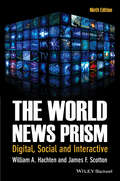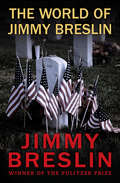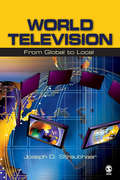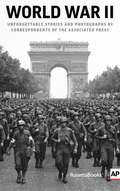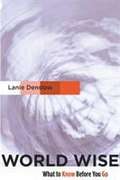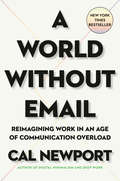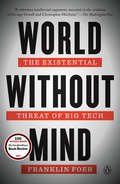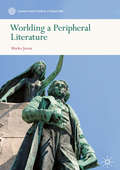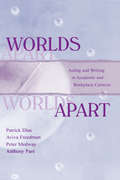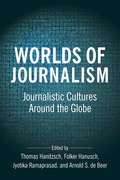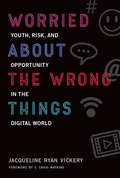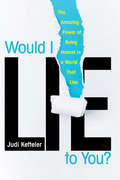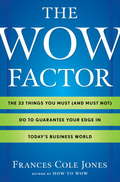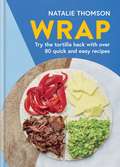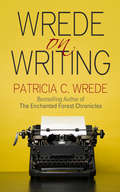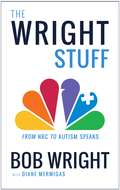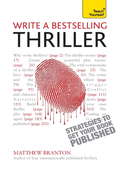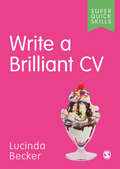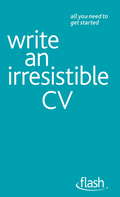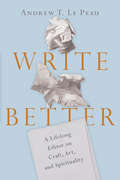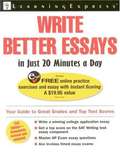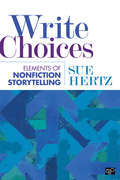- Table View
- List View
The World News Prism: Digital, Social and Interactive
by William A. Hachten James F. ScottonNow available in a fully revised and updated ninth edition, World News Prism provides in-depth analysis of the changing role of transnational news media in the 21st-century. Includes three new chapters on Russia, Brazil, and India and a revised chapter on the Middle East written by regional media experts Features comprehensive coverage of the growing impact of social media on how news is being reported and received Charts the media revolutions occurring throughout the world and examines their effects both locally and globally Surveys the latest developments in new media and forecasts future developments
The World of Jimmy Breslin: World Without End, Amen; The Gang That Couldn't Shoot Straight; Table Money; And Forsaking All Others
by Jimmy BreslinThe Pulitzer Prize–winning journalist&’s early columns &“peopled by some of the funniest, looniest and saddest characters anywhere outside of a zoo&” (The New York Times). In the 1960s, as the once-proud New York Herald Tribune spiraled into bankruptcy, the brightest light in its pages was an ebullient young columnist named Jimmy Breslin. While ordinary columnists wrote about politics, culture, or the economy, Breslin&’s chief topics were the city and Breslin himself. He was chummy with cops, arsonists, and thieves, and told their stories with grace, wit, and lightning-quick prose. Whether covering the five boroughs, Vietnam, or the death of John F. Kennedy, Breslin managed to find great characters wherever he went. This collection includes some of Breslin&’s most famous early writing. Here are the unforgettable New Yorkers Sam Silverware and Larry Lightfingers, the celebrated interview with President Kennedy&’s gravedigger, and the classic &“People I&’m Not Talking To Next Year.&” But the most important voice here is Breslin&’s—as vibrant as ever. This ebook features an illustrated biography of Jimmy Breslin including rare photos and never-before-seen documents from the author&’s personal collection.
World Television: From Global to Local
by Joseph D. StraubhaarWorld Television: From Global to Local, a new assessment of the interdependence of television across cultures and nations brings together the most current research and theories on the subject. By examining recent developments in the world system of television as well as several theories of culture, industry, genre, and audience, author Joseph D. Straubhaar offers new insights into the topic. He argues that television is being simultaneously globalized, regionalized, nationalized, and even localized, with audiences engaging it at multiple levels of identity and interest; therefore the book looks at all these levels of operation.Key FeaturesDraws upon both international communication and cultural studies perspectives: Presents a new model is presented that attempts to move beyond the current controversies about imperialism and globalization.Looks at historical patterns: Historical patterns across cultures and countries help compare where television has been and where it is going.Takes a contemporary focus: Uses of technology, flows and patterns of program development, genres of television, the interaction of producers and audiences, and patterns of audience choice among emerging alternatives are examined. Explores how the audience for these evolving forms of television is structured: The effects of these forces or patterns of television have on both cultural formations and individual identities are identified.Intended AudienceThis is an excellent text for advanced undergraduate and graduate courses in Globalizatiion and Culture, Global Media, Television Studies, Television Criticism, and International Media.
World War II: Unforgettable Stories and Photos by Correspondents of The Associated Press
by The Associated PressPowerful, visceral, and essential to preserving and understanding our past, the work of Associated Press photographers and journalists lives on through the pages of World War II.Never before in history had the day-to-day struggles and victories of war—from the home front to the front lines—been chronicled in such graphic and unflagging detail as during the Second World War. Nearly 200 photographers and reporters of Associated Press volunteered to cover the war across the globe from 1939 through 1945. The heroic achievements of these reporters and photographers—some of whom gave their lives—are remembered through the stunning photographs and moving firsthand reports of World War II: Unforgettable Stories and Photographs by Correspondents of The Associated Press.World War II commemorates the experiences of the individuals who brought the war into the homes of millions of Americans. Originally published in 1945 as Reporting to Remember: Unforgettable Stories and Pictures of the War by Associated Press Correspondents, this updated anniversary edition includes a new interview with former AP World War II correspondent George Bria, as well as a new Foreword by current AP Vice President for International News John Daniszewski.
World Wise: What to Know Before You Go
by Lanie DenslowWorld Wise covers topics ranging from general etiquette to business philosophies in specific regions of the world. It is suitable both for the seasoned professional involved in international business, hoping to sharpen skills, and the newcomer to the global business scene. Denslow seeks to help the reader overcome common cultural misunderstandings and establish effective working relationships around the world.
A World Without Email: Reimagining Work in an Age of Communication Overload
by Cal NewportFrom New York Times bestselling author Cal Newport comes a bold vision for liberating workers from the tyranny of the inbox--and unleashing a new era of productivity.Modern knowledge workers communicate constantly. Their days are defined by a relentless barrage of incoming messages and back-and-forth digital conversations--a state of constant, anxious chatter in which nobody can disconnect, and so nobody has the cognitive bandwidth to perform substantive work. There was a time when tools like email felt cutting edge, but a thorough review of current evidence reveals that the "hyperactive hive mind" workflow they helped create has become a productivity disaster, reducing profitability and perhaps even slowing overall economic growth. Equally worrisome, it makes us miserable. Humans are simply not wired for constant digital communication.We have become so used to an inbox-driven workday that it's hard to imagine alternatives. But they do exist. Drawing on years of investigative reporting, author and computer science professor Cal Newport makes the case that our current approach to work is broken, then lays out a series of principles and concrete instructions for fixing it. In A World without Email, he argues for a workplace in which clear processes--not haphazard messaging--define how tasks are identified, assigned and reviewed. Each person works on fewer things (but does them better), and aggressive investment in support reduces the ever-increasing burden of administrative tasks. Above all else, important communication is streamlined, and inboxes and chat channels are no longer central to how work unfolds. The knowledge sector's evolution beyond the hyperactive hive mind is inevitable. The question is not whether a world without email is coming (it is), but whether you'll be ahead of this trend. If you're a CEO seeking a competitive edge, an entrepreneur convinced your productivity could be higher, or an employee exhausted by your inbox, A World Without Email will convince you that the time has come for bold changes, and will walk you through exactly how to make them happen.
World Without Mind: The Existential Threat of Big Tech
by Franklin FoerFranklin Foer reveals the existential threat posed by big tech, and in his brilliant polemic gives us the toolkit to fight their pervasive influence. Over the past few decades there has been a revolution in terms of who controls knowledge and information. This rapid change has imperiled the way we think. Without pausing to consider the cost, the world has rushed to embrace the products and services of four titanic corporations. We shop with Amazon; socialize on Facebook; turn to Apple for entertainment; and rely on Google for information. These firms sell their efficiency and purport to make the world a better place, but what they have done instead is to enable an intoxicating level of daily convenience. As these companies have expanded, marketing themselves as champions of individuality and pluralism, their algorithms have pressed us into conformity and laid waste to privacy. They have produced an unstable and narrow culture of misinformation, and put us on a path to a world without private contemplation, autonomous thought, or solitary introspection—a world without mind. In order to restore our inner lives, we must avoid being coopted by these gigantic companies, and understand the ideas that underpin their success. Elegantly tracing the intellectual history of computer science—from Descartes and the enlightenment to Alan Turing to Stuart Brand and the hippie origins of today's Silicon Valley—Foer exposes the dark underpinnings of our most idealistic dreams for technology. The corporate ambitions of Google, Facebook, Apple, and Amazon, he argues, are trampling longstanding liberal values, especially intellectual property and privacy. This is a nascent stage in the total automation and homogenization of social, political, and intellectual life. By reclaiming our private authority over how we intellectually engage with the world, we have the power to stem the tide. At stake is nothing less than who we are, and what we will become. There have been monopolists in the past but today's corporate giants have far more nefarious aims. They’re monopolists who want access to every facet of our identities and influence over every corner of our decision-making. Until now few have grasped the sheer scale of the threat. Foer explains not just the looming existential crisis but the imperative of resistance.
Worlding a Peripheral Literature (Canon and World Literature)
by Marko JuvanBringing together the analyses of the literary world-system, translation studies, and the research of European cultural nationalism, this book contests the view that texts can be attributed global importance irrespective of their origin, language, and position in the international book market. Focusing on Slovenian literature, almost unknown to world literature studies, this book addresses world literature’s canonical function in the nineteenth-century process of establishing European letters as national literatures. Aware of their dependence on imperial powers, (semi)peripheral national movements sought international recognition through, among other things, the newly invented figure of the national poet. Writers central to dependent national communities were canonized to represent their respective cultures to the norm-giving Other – the emerging world literary canon and its aesthetic ideology. Hence, national literatures asserted their linguo-cultural individuality through the process of worlding; that is, by their positioning in the international literary world informed by the supposed universality of the aesthetic.
Worlds Apart: Acting and Writing in Academic and Workplace Contexts (Rhetoric, Knowledge, and Society Series)
by Patrick Dias Aviva Freedman Peter Medway Anthony ParWorlds Apart: Acting and Writing in Academic and Workplace Contexts offers a unique examination of writing as it is applied and used in academic and workplace settings. Based on a 7-year multi-site comparative study of writing in different university courses and matched workplaces, this volume presents new perspectives on how writing functions within the activities of various disciplines: law and public administration courses and government institutions; management courses and financial institutions; social-work courses and social-work agencies; and architecture courses and architecture practice. Using detailed ethnography, the authors make comparisons between the two types of settings through an understanding of how writing is operative within the particularities of these settings. Although the research was initially established to further understanding of the relationships between writing in academic and workplace settings, it has evolved to examining writing as it is embedded in both types of settings--where social relationships, available tools, and historical, cultural, temporal, and physical location are all implicated in complex ways in the decisions people make as writers. Readers of this volume will discover that the uniqueness of each setting makes salient different aspects of writers and writing, resulting in complex, and potentially unsettling implications for writing theory and the teaching of writing.
Worlds of Journalism: Journalistic Cultures Around the Globe (Reuters Institute Global Journalism Series)
by Thomas Hanitzsch Folker Hanusch Jyotika Ramaprasad Arnold S. de BeerHow do journalists around the world view their roles and responsibilities in society? Based on a landmark study that has collected data from more than 27,500 journalists in 67 countries, Worlds of Journalism offers a groundbreaking analysis of the different ways journalists perceive their duties, their relationship to society and government, and the nature and meaning of their work.Challenging assumptions of a universal definition or concept of journalism, the book maps a world populated by a rich diversity of journalistic cultures. Organized around a series of key questions on topics such as editorial autonomy, journalistic ethics, trust in social institutions, and changes in the profession, it details how the practice of journalism differs across the world in a range of political, social, and economic contexts. The book covers how journalism as an institution is created and re-created by journalists and how they experience their profession in very different ways, even as they retain a commitment to some basic, widely shared professional norms and practices. It concludes with a global classification of journalistic cultures that reflects the breadth of worldviews and orientations found in disparate countries and regions. Worlds of Journalism offers an ambitious, comparative global understanding of the state of journalism in a time when it is confronting a series of economic and political threats.
Worried About the Wrong Things: Youth, Risk, and Opportunity in the Digital World (The John D. and Catherine T. MacArthur Foundation Series on Digital Media and Learning)
by Jacqueline Ryan VickeryWhy media panics about online dangers overlook another urgent concern: creating equitable online opportunities for marginalized youth.It's a familiar narrative in both real life and fiction, from news reports to television storylines: a young person is bullied online, or targeted by an online predator, or exposed to sexually explicit content. The consequences are bleak; the young person is shunned, suicidal, psychologically ruined. In this book, Jacqueline Ryan Vickery argues that there are other urgent concerns about young people's online experiences besides porn, predators, and peers. We need to turn our attention to inequitable opportunities for participation in a digital culture. Technical and material obstacles prevent low-income and other marginalized young people from the positive, community-building, and creative experiences that are possible online.Vickery explains that cautionary tales about online risk have shaped the way we think about technology and youth. She analyzes the discourses of risk in popular culture, journalism, and policy, and finds that harm-driven expectations, based on a privileged perception of risk, enact control over technology. Opportunity-driven expectations, on the other hand, based on evidence and lived experience, produce discourses that acknowledge the practices and agency of young people rather than seeing them as passive victims who need to be protected.Vickery first addresses how the discourses of risk regulate and control technology, then turns to the online practices of youth at a low-income, minority-majority Texas high school. She considers the participation gap and the need for schools to teach digital literacies, privacy, and different online learning ecologies. Finally, she shows that opportunity-driven expectations can guide young people's online experiences in ways that balance protection and agency.
Would I Lie to You?: The Amazing Power of Being Honest in a World That Lies
by Judi KettelerWe all want the truth, don&’t we? In fact, we demand it. We divorce spouses who withhold it. We insist our children practice it. We&’re hurt when our friends don&’t divulge it. We&’re incensed by politicians who invent it. But when it comes to our own behavior, how often do we transgress? Out of diplomacy, kindness, sympathy, and privacy we don&’t always tell the truth. Yet we often barely notice. So, what happens when we do notice? When we truly focus on the decisions we&’re making around honesty? When we view our entire life through the lens of honesty? Award-winning journalist and New York Times contributor Judi Ketteler looked at her Facebook page and saw a content mother, a generous friend and sister, a good daughter, and a wife with a happy marriage. It wasn&’t quite the whole story though. In thinking about all the truths she wasn&’t revealing, Judi realized that the line between truth and deception was beginning to blur. How often had she herself paltered, exaggerated, concealed, side-stepped, or spun the truth? To answer that question, Judi started her &“Honesty Journal.&” She set out to get to the bottom of her complicated relationship with honesty and confronted her perennial fear of speaking the truth in social situations, among friends, in the workplace, with her kids—and finally, inside her complicated marriage. Blending her personal journey with the latest research into the psychology of deception, Would I Lie to You? is a timely consideration of the joys and pains of truth in a world that seems committed to lying.
The Wow Factor: The 33 Things You Must (and Must Not) Do to Guarantee Your Edge in Today's Business World
by Frances Cole JonesIn today's business world, people need solutions, skills, and confidence to land the perfect job or keep an existing one. "The Wow Factor" offers 33 things individuals can do to ensure they rise to the top, no matter the circumstance.
Wrap: Try the tortilla hack with over 80 quick and easy recipes
by Natalie ThomsonOriginating on TikTok and quickly going viral across the rest of social media, the 'wrap hack' or '4-way wrap' involves taking a tortilla wrap and using a clever quartering technique to divide the wrap into four, placing a different filling in each section and folding into a quick and delicious meal. Suitable for leftovers, breakfasts, lunches, quick snacks and sweet treats - this genius foodie hack will not only lift you out of a sandwich rut, but will also get your creative juices flowing as you try out new flavour combinations with your friends.Wrap brings together over 80 recipes for the ingenious method all in one place. Hot, cold, meat or veggie: whatever you put into your wrap, this method is the viral sensation that has to be tried.CONTENTSChapter 1: Breakfast & BrunchIncluding Smoked salmon, Tofu scramble and Sausage hashChapter 2: Quick Light BitesIncluding Shredded duck, Spicy fish goujons and Korean blue cheeseChapter 3: Hunger FixesIncluding Veggie burrito, Pulled jackfruit and Philly cheese steakChapter 4: Something SweetIncluding Banana, caramel & chocolate, Eton mess and Apple & blackberry crumble
Wrede on Writing: Tips, Hints, And Opinions On Writing
by Patricia C. WredeThe authoritative guide to the craft and business of writing. Patricia C. Wrede has been a stalwart of the sci-fi/fantasy world for decades, publishing dozens of books across multiple series, storming bestseller lists and corralling accolades from critics and fans alike. Now, with brilliant insight and a sparkling wit, Wrede shows beginning writers the ropes in Wrede on Writing. Wrede tackles all issues for writers, from the basic how-to’s to the more advanced topics on character development and worldbuilding. In her conversational tone, she gives writers the tips and tricks her experience has brought. After Wrede on Writing, authors will have the knowledge to put their tools to better use. Thinking of starting a book? Trying to finish one? Wrede on Writing will guide you towards that superior draft to send to agents, to publishers, and to readers. Before she became a successful full-time writer, Patricia C. Wrede worked in finance, and she also provides for authors an extensive look at how to manage the money—from royalties to determining the financial potential of your next project, Wrede provides authors with deep insight into the business of writing. A brilliant guide from a literary stalwart, Wrede on Writing is the book everyone with a novel under their beds or inside their heads should read.
The Wright Stuff: From NBC to Autism Speaks
by Bob Wright Diane MermigasThe former CEO of NBC &“reflects on his years at the pinnacle of network television, and also on the Wrights&’ work as co-founders of Autism Speaks&” (Palm Beach Daily News). Named president and CEO of NBC at the age of 43, he faced a two-headed dragon: on one hand, distrust from the network people deeply skeptical of the &“suit&” from GE, their new corporate parent; and on the other, fiscal oversight demands from a cautious, conservative institution reluctant to invest heavily in a media business they didn&’t understand. For the next 20 years, he managed to navigate the fine line between the two and in the process completely reinvent—and save—the network. His name is Bob Wright. Under his leadership, a traditional network, struggling to survive a changing landscape, was transformed into a $45 billion cable and internet giant. What does someone like that do when he retires? If he&’s Bob Wright, he starts all over again. At almost the exact same time as Bob&’s NBC reign was winding down, his grandson Christian was diagnosed with autism, a condition then poorly understood. Baffled by a lack of medical knowledge and community support, Bob and his wife Suzanne founded Autism Speaks, which in short order became the leading advocacy and research funding organization for this mysterious condition that so devastates families. As the two story lines unfold in The Wright Stuff, readers will gradually see that both endeavors—revitalizing NBC and building Autism Speaks—reflect the same key management tenets that apply to any organization facing disruptive change. A portion of the proceeds from this book will be donated to advance autism research.
Write a Bestselling Thriller: Strategies to write a book that thrills, enthralls and sells
by Matthew BrantonWrite a Bestselling Thriller: Strategies to Get Your Book Published is a step by step guide to putting together an unputdownable narrative. It takes you on a journey through each component of the thriller, breaking the process down into key factors such as the Hero, the Trigger, the Story, Scenes and Style. The whole of the second part is devoted to the publishing process, while the book features hundreds of pratical exercises. There are diagnostic tests, case studies, practical exercises and Aide Memoire boxes. Each chapter concludes with a reminder of the key points of the chapter (Focus Points) and a round-up of what to expect in the next (Next Step) will whet your appetite for what's coming and how it relates to what you've just read.
Write a Brilliant CV (Super Quick Skills)
by Lucinda BeckerHaving a good CV is integral for securing your perfect job. This book gives you the tools necessary to produce a persuasive CV, targeted at the relevant career and accurately reflecting your value to a potential employer. Learn how to target your CV Showcase your key skills and experience Prove your value so you're hired on the spot. Super Quick Skills provide the essential building blocks you need to succeed at university - fast. Packed with practical, positive advice on core academic and life skills, you&’ll discover focused tips and strategies to use straight away. Whether it&’s writing great essays, understanding referencing or managing your wellbeing, find out how to build good habits and progress your skills throughout your studies. Learn core skills quickly Apply right away and see results Succeed in your studies and life. Super Quick Skills give you the foundations you need to confidently navigate the ups and downs of university life.
Write a Brilliant CV (Super Quick Skills)
by Lucinda BeckerHaving a good CV is integral for securing your perfect job. This book gives you the tools necessary to produce a persuasive CV, targeted at the relevant career and accurately reflecting your value to a potential employer. Learn how to target your CV Showcase your key skills and experience Prove your value so you're hired on the spot. Super Quick Skills provide the essential building blocks you need to succeed at university - fast. Packed with practical, positive advice on core academic and life skills, you&’ll discover focused tips and strategies to use straight away. Whether it&’s writing great essays, understanding referencing or managing your wellbeing, find out how to build good habits and progress your skills throughout your studies. Learn core skills quickly Apply right away and see results Succeed in your studies and life. Super Quick Skills give you the foundations you need to confidently navigate the ups and downs of university life.
Write an Irresistible CV: Flash
by Julie GrayThe books in this bite-sized new series contain no complicated techniques or tricky materials, making them ideal for the busy, the time-pressured or the merely curious. Write an Irresistible CV helps you to write and refine a CV that communicates who you are and shows off your skills, talents and all you have to offer.
Write an Irresistible CV: Flash
by Julie GrayThe books in this bite-sized new series contain no complicated techniques or tricky materials, making them ideal for the busy, the time-pressured or the merely curious. Write an Irresistible CV helps you to write and refine a CV that communicates who you are and shows off your skills, talents and all you have to offer.
Write Better: A Lifelong Editor on Craft, Art, and Spirituality
by Andrew T. Le PeauWriting is not easy. But it can get better. In this primer on nonfiction writing, Andrew Le Peau offers insights he has learned as a published author and an editor for over forty years, training, guiding, and cheering on hundreds of writers. Here are skills that writers can master—from finding strong openings and closings, to focusing on an audience, to creating a clear structure, to crafting a persuasive message. With wide-ranging examples from fiction and nonfiction, Le Peau also demystifies aspects of art in writing such as creativity, tone, and metaphor. He considers strategies that can move writers toward fresher, more vital, and perhaps more beautiful expressions of the human condition. One aspect of writing that rarely receives attention is who we are as writers and how writing itself changes us. Self-doubt, fear of criticism, downsides of success, questions of authority, and finding our voice are all a part of the exploration of our spirituality as writers found in these pages. Discover how the act of writing can affect our life in God. Whether you're a veteran writer, an occasional practitioner, a publishing professional, or a student just starting to explore such skills, Le Peau's wit and wisdom can speed you on your way.
Write Better Essays in Just 20 Minutes A Day (Second Edition)
by Learningexpress StaffEssay writing need not be daunting. Taking the reader step-by-step through the entire process, from the initial organization of ideas to the final stages of proofreading, Write Better Essays in Just 20 Minutes a Day covers all the essentials: how to understand essay questions, create a strong thesis, develop a captivating introduction, support ideas, and revise the work. Included are plenty of sample essays, strategies for planning and revising in-class essays, ways to overcome writer's block, and tips on achieving higher scores on essay exams.
Write Choices: Elements of Nonfiction Storytelling
by Susan Sue HertzDeveloping nonfiction writers at any stage of their career Write Choices: Elements of Nonfiction Storytelling helps writers cultivate their nonfiction storytelling skills by exploring the universal decisions writers confront when crafting any kind of factual narrative. Rather than isolating various forms of narrative nonfiction into categories or genres, Sue Hertz focuses on examining the common choices all true storytellers encounter, whether they are writing memoir, literary journalism, personal essays, or travel essays. And since today’s writers are no longer confined to paper, Write Choices also includes digital storytelling options, and how writers can employ technology to enhance their narratives. Integrating not only her own insights and experience as a journalist, nonfiction book author, and writing instructor, but also those of other established nonfiction storytellers, both print and digital, Hertz aims to guide writers through key decisions to tell the best story possible. Blending how-to instruction with illuminating examples and commentaries drawn from original interviews with master storytellers, Write Choices is a valuable resource for all nonfiction writers, from essayists to memoirists to literary journalists, at any stage of their career.
Write Choices: Elements of Nonfiction Storytelling
by Susan Sue HertzDeveloping nonfiction writers at any stage of their career Write Choices: Elements of Nonfiction Storytelling helps writers cultivate their nonfiction storytelling skills by exploring the universal decisions writers confront when crafting any kind of factual narrative. Rather than isolating various forms of narrative nonfiction into categories or genres, Sue Hertz focuses on examining the common choices all true storytellers encounter, whether they are writing memoir, literary journalism, personal essays, or travel essays. And since today’s writers are no longer confined to paper, Write Choices also includes digital storytelling options, and how writers can employ technology to enhance their narratives. Integrating not only her own insights and experience as a journalist, nonfiction book author, and writing instructor, but also those of other established nonfiction storytellers, both print and digital, Hertz aims to guide writers through key decisions to tell the best story possible. Blending how-to instruction with illuminating examples and commentaries drawn from original interviews with master storytellers, Write Choices is a valuable resource for all nonfiction writers, from essayists to memoirists to literary journalists, at any stage of their career.
